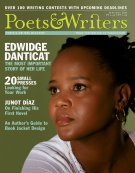As even he would admit, 2005 was a bad year for Bin Ramke. Up until then the poet was enjoying a firmly established career in American letters. He'd clocked decades of distinguished teaching as a faculty member of the PhD program in creative writing at the University of Denver. As editor of the University of Georgia Press's Contemporary Poetry Series, a position he'd held since 1984, he'd made his mark putting out books by poets such as X. J. Kennedy, Timothy Liu, Terese Svoboda, and C. D. Wright. He'd also authored eight books, his last four published by the esteemed University of Iowa Press. But in 2005, Ramke's career hit some rough road.
While many poets do their strangest and most groundbreaking work in their early books and then settle into predictable grooves, a look at Ramke's oeuvre shows he is a poet whose work has gotten progressively stranger and stronger.
That year the Contemporary Poetry Series was targeted by the "poetry watchdog" Web site Foetry.com. As has been reported in these pages and elsewhere, Alan Cordle, the man behind Foetry (which has since shut down), claimed that a winner of the Georgia competition was corruptly selected in 1999, when outside judge Jorie Graham chose a manuscript by Peter Sacks—her soon-to-be Harvard colleague and soon-to-be husband—for publication. Ramke defended Graham's choice and his decision to publish Sacks's book. Ensuing press coverage of the accusation led, ultimately, to Ramke's retiring as editor; the University of Georgia Press subsequently ended the series altogether.
The squabble also called into question Ramke's publishing relationship with the University of Iowa Press, for whom Graham had edited a series of poetry books. As a result, Ramke decided to take a break from publishing with Iowa, leaving his next manuscript homeless.
Undoubtedly, Ramke was caught in the crossfire of an ongoing debate in poetry: on one side, those who believe that poets who forge lives in the hermetic world of academia succeed more through connections than talent; on the other, those who believe such accusations are, in most cases, sour grapes.
As with many such tales, there was more to the story. While pressure from the controversy certainly influenced his decision to retire from the editorship, Ramke was contending with a range of family problems at the time: "My son became very ill and my wife had an eye problem—she was effectively blind—and I just said I couldn't continue." There were other concerns too—Ramke realized he would have had to do significant fund-raising to keep the series going, something the difficulties he'd encountered in his personal life would have made impossible. Ramke still regrets the way the series ended, but is proud of what he accomplished at the University of Georgia Press: "I will admit it was very painful, because I tend to take things personally. But, looking back, in all of that controversy, no one actually said that the books weren't good."
And now, two years later, the dust having settled, Ramke has emerged stronger than ever. His new book, Tendril, is out this month from Omnidawn, a small experimental poetry and fiction publisher based in Richmond, California, that has published the work of such important poets as Keith and Rosmarie Waldrop and Lyn Hejinian, among others. The book's arrival confirms not only Ramke's talent and tenacity, but his uncommon commitment to the development of his creativity. While many poets do their strangest and most groundbreaking work in their early books and then settle into predictable grooves, a look at Ramke's oeuvre shows he is a poet whose work has gotten progressively stranger and stronger. Ramke has emerged as one of the avant-garde's treasured half-secrets.








